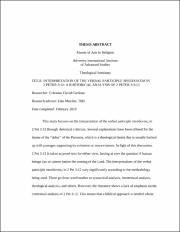Interpretation of the verbal participle Speudontas in 2 Peter 3:12 : a rhetorical analysis of 2 Peter 3:3-13
Abstract
This study focuses on the interpretation of the verbal participle σπεύδοντας in 2 Pet 3:12 through rhetorical criticism. Several explanations have been offered for the theme of the “delay” of the Parousia, which is a theological theme that is usually backed up with passages supporting its existence or non-existence. In light of this discussion, 2 Pet 3:12 is taken as proof-text for either view, having at core the question if human beings can or cannot hasten the coming of the Lord. The interpretations of the verbal participle σπεύδοντας in 2 Pet 3:12 vary significantly according to the methodology being used. These go from word studies to syntactical analysis, intertextual analysis, theological analysis, and others. However, the literature shows a lack of emphasis on the contextual analysis of 2 Pet 3:12. This means that a biblical approach is needed whose
main emphasis is on the internal evidence of 2 Peter, in order to understand the text in its most natural sense.
Rhetorical criticism as method of biblical interpretation is used in this study in order to understand 2 Pet 3:12 in light of its immediate context. This means that the author’s line of thought and propositions are followed in their logical order. In other words, this rhetorical analysis helps to understand the logic, emphasis, force, and type of the author’s arguments, showing in this way the function and meaning of 2 Pet 3:12 within the discussion. Therefore, this study assumes that the Epistle of 2 Peter is a letter with rhetorical elements, a conclusion that is based on the apologetic and persuasive nature of the Epistle. Thus, it is this connection to rhetoric that facilitates the use of rhetorical criticism in a text such as 2 Pet 3:12.
This study concludes that Peter’s emphasis throughout his Epistle is on the certainty of the coming of the Lord, for sure He will come. The verbal participle σπεύδοντας in 2 Pet 3:12 strengthens this idea by pointing to the attitude that the believers should have in light of such a reality. This is, they are to “eagerly wait” for the Lord’s coming while having a holy conduct. Peter does not suggest that the Lord’s coming should be hastened by human beings, which is automatically an assumption of a delay, rather he encourages his readers to be ready for this magnificent event which will take place in God’s own time.


